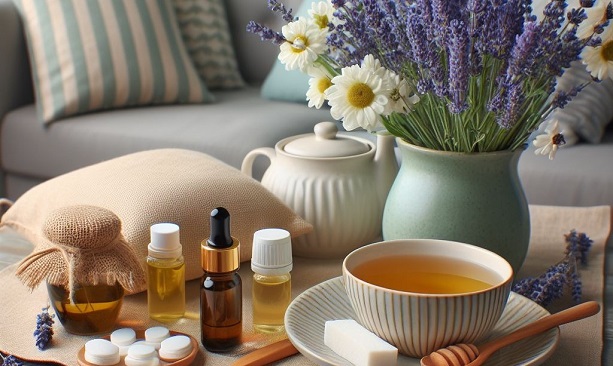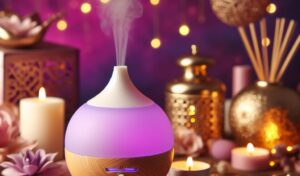Homemade sleep remedies! Forget the common misconception that you need to rely on prescription pills or expensive treatments to combat sleep issues. Natural, DIY remedies are not only effective but also safe and easy to integrate into your nightly routine.
Understanding Sleep Challenges
Sleep isn’t just a period of inactivity; it’s a crucial function for our mental and physical health. Yet, so many of us struggle to close our eyes at night and slip into rest. Whether it’s the hustle of daily life, stress, or other disturbances, poor sleep can significantly affect our energy, mood, productivity, and overall health.
Insomnia and frequent awakenings are common sleep issues that many people face, and the impacts can be more severe than just feeling groggy the next morning.
Homemade sleep remedies offer a gentle yet effective way to enhance our sleep quality without the side effects often associated with pharmaceutical sleep aids. These natural solutions not only help in falling asleep faster but also in achieving a deeper and more restful sleep cycle.
The Benefits of Natural Sleep Remedies
Choosing natural sleep remedies over pharmaceutical options not only reduces the risk of dependency and side effects but also aligns with a holistic approach to health. These remedies, enriched with nature’s best, work in harmony with your body’s natural rhythms, promoting not just better sleep but also overall well-being.
7 Proven Homemade Sleep Remedies
Here are some proven homemade sleep remedies.
Chamomile Tea: A Natural Sedative
Chamomile tea isn’t just your average bedtime beverage; it’s a stalwart ally in the battle against insomnia. Known for its gentle sedative effects, this herbal tea helps soothe the nervous system, preparing your body for a night of deep, restorative sleep.
A warm cup of chamomile tea before bed can reduce anxiety and set a calm mood, making it easier to drift off. However, while chamomile is great for most, it may cause allergic reactions in those sensitive to plants in the daisy family.
Ultimately, for many sleepless souls, chamomile tea is the golden ticket to dreamland, offering a simple, effective way to embrace nightly tranquility without any pharmaceutical aids.
Lavender Oil: Soothing Aromas for Sleep
Lavender oil is renowned for its ability to enhance sleep quality through its calming scent, which has been shown to reduce anxiety levels and slow down the heart rate. Introducing lavender oil into your bedtime routine, either through a diffuser or a few drops on your pillow, can significantly improve your sleep.
While it’s mostly beneficial, the potency of the fragrance might be overwhelming for some users, and its oil form should be used cautiously to avoid skin irritation. In conclusion, lavender oil is a powerful, natural tool for improving sleep, but it’s important to use it sparingly and find the right balance that works for you.
Also read: Natural Body Oils
Magnesium-Rich Foods Before Bed
Incorporating magnesium-rich foods like almonds, spinach, and bananas into your evening snack can be a game-changer for those struggling with sleep. Magnesium is a natural relaxant that helps deactivate adrenaline and calm the nervous system, making it easier to fall asleep.
However, it’s crucial to consume these snacks in moderation as overeating before bed can lead to discomfort and disrupt your sleep. For those looking to naturally enhance their sleep quality, a light snack of magnesium-rich foods can be a practical addition to your nighttime routine.
Meditation and Mindfulness Exercises
Meditation and mindfulness can transform your pre-sleep routine into a powerful ritual to combat insomnia. These practices help you detach from the day’s stresses and focus on the moment, which can significantly decrease the time it takes to fall asleep.
While incredibly beneficial, some might find these techniques challenging to adopt, particularly if they struggle with sitting still or clearing their minds.
However, with regular practice, meditation and mindfulness can not only improve sleep but also overall mental health, making them worthwhile practices for anyone looking to enhance their nighttime routine.
Creating a Sleep-Friendly Environment
The environment in which you sleep can profoundly impact the quality of your rest. Ensuring your bedroom is dark, quiet, and cool can mimic the natural conditions the body craves for sleep.
Blackout curtains, sound machines, and temperature control can all contribute to creating this ideal sleep environment. While these adjustments are generally beneficial, the initial setup can be costly and time-consuming.
Nevertheless, investing in a sleep-friendly bedroom environment pays off by fostering deeper, more consistent sleep.
The Power of Proper Bedtime Routine
Establishing a proper bedtime routine is crucial for signaling to your body that it’s time to wind down. This routine might include activities like reading a book, taking a warm bath, or practicing gentle stretches.
Consistency is key, and while it might be tempting to skip your routine on busy nights, this can lead to inconsistent sleep patterns.
Developing and sticking to a bedtime routine helps reinforce your body’s natural sleep-wake cycle, promoting better sleep quality night after night.
Herbal Pillow Sprays and Fillers
Herbal pillow sprays and fillers are a delightful way to use the power of aromatherapy to enhance your sleep. Ingredients like lavender, chamomile, and vetiver release soothing scents that can help calm the mind and induce sleep.
While these herbal additions are generally safe and effective, it’s important to choose scents that you find pleasant, as a strong dislike can have the opposite effect.
Overall, herbal pillow sprays and fillers offer a simple and enjoyable method to enhance the bedtime experience and encourage restful sleep.
Each of these remedies provides a unique approach to improving sleep, combining the comforts of home with the efficacy of natural ingredients.
Also read: How Hot Chocolate Help You Sleep
Additional Natural Sleep Solutions
Here are some additional natural homemade sleep remedies.
Homemade Natural Sleep Aids
While we’ve explored some fantastic options already, there are more homemade sleep aids that pack a punch. For instance, banana tea, known for its high magnesium and potassium content, can be a game-changer for those seeking a peaceful night.
Simply boil a whole banana, peel included, in water for about 10 minutes, then strain and drink the water before bed. The benefits are twofold: it’s both soothing and packed with minerals that promote muscle relaxation.
Be aware, though, that while banana tea is generally safe, it’s best consumed in moderation due to its natural sugar content. If you’re looking for a simple, tasty way to drift off, this might just be your new go-to remedy.
Diet and Its Impact on Sleep
Let’s talk about the dinner plate and its direct link to how well you sleep. Certain foods can naturally promote sleepiness and relaxation.
Cherries, for instance, are one of the few natural sources of melatonin, while fatty fish are rich in vitamin D and omega-3 fatty acids, which have been linked to better sleep quality due to their impact on serotonin production. Integrating these foods into your evening meals can naturally help regulate sleep patterns.
However, it’s important to avoid heavy, rich foods right before bed, as they can lead to discomfort and disrupt sleep. Crafting a dinner menu with sleep-enhancing foods can be a delicious and effective way to ensure a night of quality sleep.
How to Use Essential Oils for Insomnia
Essential oils can be a serene gateway to sleep, especially for those battling insomnia. Among the top choices, lavender, chamomile, and bergamot stand out for their relaxing properties.
When using essential oils, it’s crucial to mix them with a carrier oil if you’re applying them directly to your skin to avoid irritation. For a nightly sleep ritual, add a few drops of your chosen essential oil to a diffuser before bedtime or dab a small amount on your temples and wrists.
Be cautious, though, as essential oils are potent and can be overpowering if overused. Start with a lighter concentration to gauge how your body reacts.
Also read: Make Rosemary Oil at Home
Dealing with Nighttime Awakenings
Waking up in the middle of the night is a common issue that can disrupt the quality of your rest. To combat this, consider a two-pronged approach involving both behavioral and environmental changes.
Firstly, ensure your sleeping environment is optimized for comfort—this means adjusting the temperature, reducing noise with white noise machines or earplugs, and blocking out light with blackout curtains.
Behaviorally, establish a calming bedtime routine that may include reading or light stretching, but avoid screen time, as the blue light can stimulate wakefulness.
If awakenings persist, a small notebook by your bed can be helpful; jotting down thoughts or worries can clear your mind and ease you back to sleep. While these strategies can be very effective, it’s important to be patient and consistent with them.
Also read: Natural Remedies for Tooth Abscess
Conclusion
As we wrap up our exploration of homemade sleep remedies, it’s clear that natural solutions hold immense power in improving sleep quality. From the soothing effects of chamomile tea to the calming ambiance created by lavender oil, these remedies offer a range of options to help you achieve a deeper, more restful sleep.
Frequently Asked Questions
Here are some common questions.
How long does it take for herbal teas like chamomile to affect sleep?
Herbal teas can begin to soothe your nerves and relax your body fairly quickly. For best results, try drinking chamomile tea about 30 minutes before you plan to go to sleep. This gives your body enough time to process the calming effects.
How can I make my bedroom more conducive to sleeping?
Start by minimizing noise and light – think about using blackout curtains and white noise machines. Also, keep the room at a comfortable, cool temperature. A tidy, inviting bedroom can also make a big difference in your mindset at bedtime.
Are there any negative effects of using herbal pillow sprays?
Herbal pillow sprays are generally very safe, but it’s possible to have allergies to certain herbs. If you’re trying a new spray, start by using it lightly to see how you react, especially if you have known allergies.
How can I keep a consistent sleep schedule?
Try to go to bed and wake up at the same time every day, even on weekends. This regularity reinforces your body’s sleep-wake cycle. Avoid stimulants like caffeine and intense electronic screens close to bedtime as they can disrupt your ability to fall asleep.







